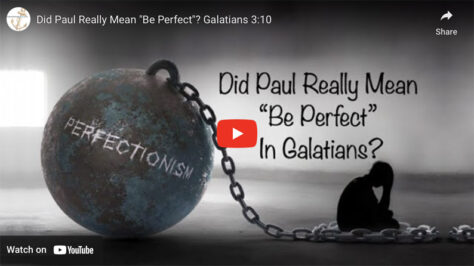
The following question was received at questions@reasonsforhopeJesus.com from one of our regular readers. Pastor Chuck agreed to address it directly by emailing the person who asked. We share Pastor Chuck’s biblical and well-articulated answer on this subject.
You’ll note that this is longer than most Got Questions? but be assured it is well worth your time to read. Pastor Chuck’s response will help you to better understand this difficult subject, according to what the Bible teaches about it, and be prepared with answers if such questions are posed to you.
Question
Can Satan understand when people speak in tongues? If he cannot understand when people speak in tongues, is it different than Acts 2: 6-12 where the people understood the Apostles speaking in tongues? What does the Bible teach about speaking in tongues?
Answer
I pray you are well and always pray that a brother in Christ is growing in the Word, maturing into the One (Jesus) whom our Father has called us to be conformed to, thus fulfilling His very purpose for us (Romans 8:28-29). May I say that I would desire to talk about this face-to-face because your questions deal with a very controversial and sensitive matter that is constantly being brought to the forefront in the body of Christ, the church. But I will attempt to deal with it in this email because it is something I’ve had to deal with all too often. It has become, sadly, a divisive subject amongst Christians.
You Asked
“Can Satan understand when people speak in tongues?” MY ANSWER: There is nowhere in Scripture where we are told that Satan is omniscient (all-knowing). This is a characteristic, and a powerful one, that belongs to our Creator God alone (1 John 3:20). Remember, Satan is not God, he is not the Creator, rather he is a created being, a created angel, an extremely powerful fallen angel (Isaiah 14). In our current state in the flesh, we must realize that he is no one to fool with or take lightly (Ephesians 6:10-18). To the Christian he tempts (1 Chronicles 21:1), afflicts (Job 2:7), accuses (Zechariah 3:1), sifts (Luke 22:31), deceives (2 Corinthians 11:3), and comes at us in disguises (2 Corinthians 11:14-15). But . . . he is not all-knowing. So the ANSWER to your question is, “No, Satan cannot understand people speaking in tongues.”
Your question regarding Acts 2:6-12
Clearly, in the context of Acts 2:6-12, Jesus’ promise of the giving of the Holy Spirit (John 16:7-14; noting 15:26) was fulfilled. This was on The Day of Pentecost (Acts 6:1). On this day those who were so designated by Jesus “were filled with the Holy Ghost” (Acts 6:2-4), just as Jesus said would take place. Those who were so “filled . . . began to speak with other tongues.”
This word “tongues” is the Greek word, glossais, and it means “languages.” These were languages that were understood (see Acts 6:6 and Acts 6:8) by those who were “dwelling at Jerusalem,” who were “Jews, devout men, out of every nation under heaven” (Acts 6:5). “Ethnic languages (were) miraculously spoken as a result of the baptism of the Holy Spirit by those whose mother tongue was different” (Zodhiates).
In Acts 6:6 and Acts 6:8 the word for “language” (V-6) and “tongue” (V-8) is the Greek word, dialektos, from which we get our English word dialect. It means “language spoken by a people or province, ethnic language.” The Holy Spirit came upon the apostles, and they began to speak in such languages that were dialects that their hearers, being from many nations and provinces, could understand.
Simply put, the apostles were able to speak in languages foreign to them but understood by the multitude who were hearing them. This scenario of ethnic languages also holds for the conversions in Acts 10 and 11. In Acts 2, on the Day of Pentecost, the Jews from different nations and provinces were able to hear the gospel message in their own language because the languages spoken by the apostles were in their particular dialects: “And how hear we every man in our ‘dialect,” wherein we were born?” (V-8). Satan would have been able to understand what was said on that particular day (getting an earful of the gospel he hates so much) since we know that languages and dialects are something he is ignorant of since he is equipped to deceive the whole world (Revelation 12:9), a world that lies in his power (1 John 5:19) for he is the prince of this world (John 14:30).
Now . . . with a great desire to teach biblical truth, I’m going to deal with the subject of tongues as I believe the Bible teaches it.
On the Matter of “Tongues”
There are three kinds mentioned in the New Testament (take note that the Old Testament addresses the physical tongue only).
- Tongues that are ethnic languages; the speaker is able to speak in a language, a dialect, that another person of that language or dialect can understand even though the language is foreign to the speaker.
- Tongues that refer to the human organ; James refers to this troublesome little organ a lot in his letter.
- Tongues that speak of ecstatic (“characterized by ecstasy”) utterances associated with pagan religious practices.
Having clarified that the tongues of Acts 2 were known languages, the only other place this subject is of any note is in 1 Corinthians. Here one must take note of the heavy influence of pagan practices that the Corinthian church members had come from. These practices included, among many things, a heavy dose of Tongues #3.
“Across the bay from Corinth was Delphi, Greece’s most famous center of oracles” (Zodhiates).
This place of pagan worship was in the lifestream of the citizens of Corinth. It was from the Delphic oracle (look it up; the Oracles of Delphi) that the people of Corinth sought answers to a multitude of life’s issues. The process of getting answers from the priestesses began with a citizen submitting a question that would then be given to the priestess.
The priestess would go through a process of so-called purification (necessary since she was going to be communicating with the gods), take a position over a chasm that exuded intoxicating fumes, and then begin to speak in ecstatic utterances, which was gibberish to the common man. The “incoherent sounds which were interpreted (observe both speaking in an unknown tongue and the interpretation of it) in hexameter verse by a waiting poet” (Zodhiates) were given as an answer to the citizen who had made the inquiry.
According to what has been discovered in regards to this pagan ritual, “The interpretation . . . was always obscure and frequently equivocal,” (Zodhiates) and left the inquiring citizen as much in the dark as they had been when they originally made their request. Why am I telling you all of this? Highly influenced by the pagan religion they had come out of, the believers at Corinth needed the apostle Paul to straighten them out on the subject of tongues.
To put it lightly, they were confused and had brought the pagan practice of ecstatic utterances into the assembly of believers. Very truthfully, and always with the most humble intent, as a teacher of the Scriptures and having been involved in churches that practice the speaking of tongues, I see absolutely no reason for this practice in today’s church. It certainly has, as I have noted previously, caused problems in the body, and that is never a good thing.
Experience Over Doctrine
I believe the practice of tongues today is a desired euphoric experience that many elevate above sound doctrine. Man is susceptible to signs and wonders and can all too often seek such experience rather than applying oneself to in-depth study and ordering one’s steps according to the commandment of our Lord.
If you read 1 and 2 Timothy, you will find that nowhere is it instructed for believers to seek such an experience but we are definitely commanded to keep and teach sound doctrine. Sound doctrine is essential to the health of the body of Christ (2Timothy 4:1-5). I say this emphatically! “
One more time for clarity, in Mark 16:17; 1 Corinthians 12:10, 28, 30; 13:1, 8; 14:5, 6, 18, 22, when the word glossai is used in the plural with a singular pronoun, reference is made to ethnic languages. When the word ‘tongue’ is used in the singular, glossa as in 1 Corinthians 14:2, 4, 13, 19, 26, 27 it refers to the Corinthian ecstatic utterance (NOTE: Interestingly enough, the King James translators, with no certain group to appease in their translation work, noted the difference and evidently knew their history for they added, in the appropriate places, the word ‘unknown’ in parenthesis prior to the English word ‘tongue’ thus seeking to highlight a difference). In 1 Corinthians 14:9 it refers to the physical tongue of man (#2 in the list above), and in 1 Corinthians 14:23, being in the plural with a plural pronoun, it refers to the Corinthian ecstatic utterances.” (Zodhiates)
Clarity is Important
“The thesis of the Apostle Paul in 1 Corinthians 14 is that no one should be speaking in the presence of other fellow human beings without being understood.” (Zodhiates) It is essential, then and in the day you and I live, that what is said by us is always clearly stated and always clearly understood. What we say as Christians is not to be masked in any manner by language or especially, by some ecstatic utterance. It would be Satan’s desire that we not communicate sensibly, that we never communicate in a manner that is clear and doctrinally sound. We in the church should be aware of his devices, his schemes, and his desires (2 Corinthians 2:11), for Satan is always desiring to cloud and distort the clear exposition of the Word of truth.
One Last Point
To drive home the point that this matter of tongues was a unique problem in Corinth that Paul had to correct, note that tongues is never referred to in Romans, 2 Corinthians, Galatians, Ephesians (and note chapter 5:18 and what the filling of the Spirit is to produce), Philippians, Colossians, 1 and 2 Thessalonians, or the pastoral epistles, or anywhere else in the New Testament. If tongues were such an important practice that so many in the church are chasing after and exhorting others to do, why is it not found throughout the New Testament?
It has always been my goal to help believers grow in the faith, to be established in it, and such “that we henceforth be no more children, tossed to and fro, and carried about with every wind of doctrine, by the sleight of men, and cunning craftiness whereby they lie in wait to deceive” (Ephesians 4:14; note also how Paul rebuked the Corinthian believers in 2 Corinthians 14:20). I pray this helps. Apply yourself to studying the Word, always seeking understanding, and always rightly dividing the word of truth (2 Tim 2:15). Pastor Chuck
Response From Our Reader
Whao!!!! Praise God. I have never read so much on the subject of tongues. Sincerely, I cannot claim to have understood all that you have written. I have read it over and over again and will continue to do so until the entire message sinks in. It has helped clear my questions and added more knowledge to this subject.
All these years, I have practice speaking in tongues both in private and public and kept wondering each time whether it is what I should be doing. Most times, I feel inadequate because I do not feel that spiritual fulfillment whenever I am done. Thank God, this has given me more understanding as I will not attempt to continue in it but will seek to understand more the word of God.
God bless you more and more and continue to give you more insight in Jesus Name. You have been a blessing to me.
Thank you, [Reasons for Hope* Jesus reader]
Reminder
Do not let the subject of tongues become divisive. It is our desire to present what the Bible teaches and to allow God’s Word to determine this issue. Our hope is to equip you with Biblical knowledge so you can share it with others, but always do so with kindness and meekness remembering that Jesus wants His Body to be united, just as He and the Father are one.
John 13:35 By this shall all men know that you are my disciples, if you have love one to another.
*******
Jesus is the Reason this Ministry Exists
At Reasons for Hope* Jesus, we are committed to equipping, encouraging, and empowering Christians to know Jesus better, love Him more, and share their faith. We also reach the lost through our Salvation Page.
With your support, we can continue to provide valuable resources and engaging content. Please join us in our mission by donating today. Your generous contribution helps us expand our outreach of sharing biblical truths and hope in Jesus. Thank you for your kindness and for being an integral part of our mission.
*******
*******
***A Hidden Message in Psalm 23?***
Hidden in the six verses of Psalm 23 are 11 names for Jesus. When you subscribe to our newsletter, we’ll send you The Names of God in Psalm 23 PDF that reveals all 11 names and Scripture verses of comfort and hope (link will be sent in your confirmation email).
 A Room with a View of Eternity—The Last Will & Testament of Jesus Christ Take a seat at the Master's table. Learn about the riches He gives to all who are His. This book will bless and encourage you, give you hope, and help you live in the joy of your salvation and the riches of Christ that are yours.
A Room with a View of Eternity—The Last Will & Testament of Jesus Christ Take a seat at the Master's table. Learn about the riches He gives to all who are His. This book will bless and encourage you, give you hope, and help you live in the joy of your salvation and the riches of Christ that are yours.

The Top Ten Got Questions? in 2023
- The Meaning of NUMBERS in the Bible?
- Was Jesus CRUCIFIED on Wednesday, Thursday, or Friday?
- How was Jesus Like a Worm? What’s the CRIMSON (OR SCARLET) WORM in Psalm 22?
- How are the Shepherd’s ROD and STAFF Different?
- How long did JOB SUFFER?
- What is the Significance of the Wise Men's THREE GIFTS? And were they kings?
- Did The Wise Men Arrive 12 DAYS AFTER JESUS’ BIRTH? Or Was It Much Later?
- Jesus’ Last Days TIMELINE: the Cross and the Resurrection
- The Meaning of COLORS in the Bible?
- Did Jesus Fight Satan to Take Back the KEYS of Death and Hell?
There is much to be learned from those who have gone before us in the faith. Check out our Cloud of Witnesses category that features the words of departed saints who are now with the Lord in glory. Their words equip and encourage us even to this day. Take a few minutes to hear...
- ONLY ONE LIFE, Twill Soon Be Past – by C.T. Studd (1860 – 1931)
- “The Love of God is Greater Far” by Frederick M. Lehman (1917)
- Prayers from Billy Graham
- Who Was Robert Robinson? What’s the Story Behind “Come Thou Fount”
- “Immanuel” — A Poem by Charles Spurgeon (1834-1892)
- Who Am I? A Poem by Deitrich Bonhoeffer (1905-1945)
- Understanding the Everlasting Arms of God, by J.R. Miller (1840–1912)
- 24 Reasons Why I Love America, by John Wayne (1907-1979)
- Give Me Perpetual Broken-heartedness (from The Valley of Vision)
- Abide with Me, by James Smith, 1859
This remains one of our most popular pages viewed.![]()

TOP TEN Videos from Reasons for Hope* Jesus
- Memorial Day BAGPIPES TRIBUTE: Amazing Grace
- RISE AND SHINE and Give God the Glory, Glory!
- WERE YOU THERE When They Crucified My Lord?
- PAUL HARVEY: THE BIRDCAGE
- PRESIDENT RONALD REAGAN: A SOLDIER'S PLEDGE
- Hark! the Herald Angels Sing -- CHARLIE BROWN Christmas
- JOHN WAYNE ~ WHY I LOVE AMERICA
- Jimmy Stewart - Nativity Scene Prayer: Mr. Krueger's Christmas
- THE LEGEND OF THE CANDY CANE - A Christmas Story to Share
- Not by Might, Not by Power, But BY MY SPIRIT says the Lord (Zechariah 4:6)
*****************























